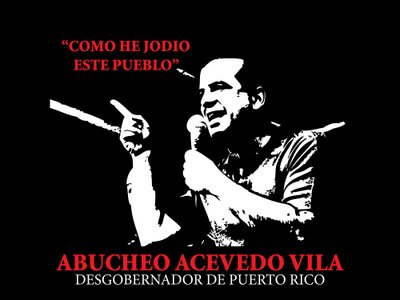Puerto Rico Needs Chance To Choose April 7, 2006 By Hon. Pedro Rosselló
As spring gradually begins to makes its presence felt across North America, the Caribbean Sea is saying goodbye to another gloriously balmy winter. In a region of year-round sunshine, however, it is ironic that one especially verdant isle has spent half a millennium under a cloud - a civic cloud: Puerto Rico has been engulfed for more than five centuries in the dark shadow of colonialism.
In 1493, Columbus claimed Puerto Rico for Spain. In 1898, Uncle Sam snatched it away. Since 1917, Puerto Ricans have been U.S. citizens. Yet never, under either of their homeland's owners, have Puerto Ricans possessed civic equality.
Residents of Puerto Rico cannot vote for president or send an enfranchised delegation of U.S. senators and representatives to defend their interests in Congress.
Due to Puerto Rico's nebulous status as a "territory," its roughly 4 million inhabitants are frequently perceived on the mainland as somehow being "foreign" - a label that is perhaps even more onerous for the nearly 4 million additional people of Puerto Rican descent who reside within the 50 states.
Every decade, the Census Bureau counts us - but it then omits us from its national population totals (Puerto Rico is consigned to what amounts to an addendum!).
As everything from opera stars to baseball stars and from surgeons general to major generals, individual Puerto Ricans have long been contributing to America's greatness. Unless they relocate to a state, though, they remain second-class citizens by constitutional edict.
So why is Puerto Rico not already a proudly sovereign nation or enjoying proud parity as a member of the U.S. family of states?
That question cannot be answered in a few hundred words. A combination of factors has been responsible for miring us in immobility, and those factors include the Puerto Rican people's own failure to reach agreement on how to resolve the problem. The ultimate decision-making authority, however, rests with Congress - and Congress is now considering legislation that could at last unscramble this Gordian knot.
If it becomes law as it should, the Puerto Rico Democracy Act of 2006 will - for the first time in history - federally mandate a referendum in which the Puerto Rico electorate will be able choose between keeping the territorial status quo or having a second vote on whether to become a state or a fully independent sovereign nation. Such federal sponsorship is critically important, because previous locally initiated referendums on status have invariably been mere "beauty contests." Voters could never be sure that Washington would take the outcome seriously.
Reducing the vote to two choices will help bring the question of Puerto Rico's sovereignty to a head. Previous referendums offered voters anywhere from three to five choices, with the result that most of them yielded inconclusive results. On the one occasion (in 1967) that a status proposal captured an absolute majority, Congress took no action to implement the winning choice.
In addition, the bill now pending would break new ground by extending referendum voting rights to all otherwise eligible persons residing outside Puerto Rico, so long as they were born in the territory.
The Puerto Rico Democracy Act of 2006 has more than 100 co-sponsors from both political parties. It adheres closely to a blueprint for congressional action that was released three months ago by President Bush's Task Force on Puerto Rico's Status. Thus, if the House and Senate adopt the bill, there is every reason to believe that the president will sign it.
Ever since the earliest years of the Cold War, when "colonialism" abruptly became a global pejorative, Uncle Sam has endured the taunts of overseas tyrants who condemn the "bondage" in which "Yankee imperialism" is "holding" Puerto Rico. Hypocritical such denunciations may be, but that is no reason to continue ignoring them.
With respect to the Puerto Rico Democracy Act, I urge all Americans of goodwill to exhort Congress in the words of President Harry S Truman: "Do your duty, and history will do you justice."
Pedro Rossello, a pediatric surgeon, was governor of Puerto Rico from 1993 until 2001 and is a member of the Puerto Rico Senate.



